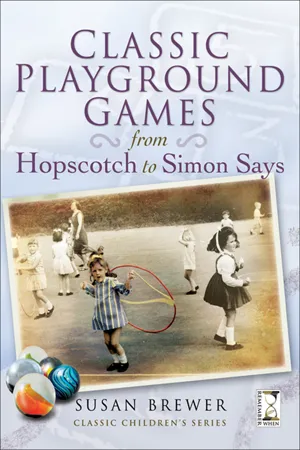
This is a test
- 192 pages
- English
- ePUB (mobile friendly)
- Available on iOS & Android
eBook - ePub
Book details
Book preview
Table of contents
Citations
About This Book
"[A] combination of history and meaning behind favorite playground games and the verses... virtually guaranteed to make you laugh and sing" (Fiona Shoop, author of How to Deal in Antiques ). This delightful book records favorite childhood games and recalls forgotten rhymes. With more children suffering from obesity, Susan Brewer looks at the social games we used to play from skipping to chase games that used up our energy during recess. Instead of costly computer games, we used rhyming games, played Jacks, and showed our balancing skills during competitive games of hopscotch. A charming book, full of anecdotes and nostalgia for how we remember our favorite place at school—the playground.
Frequently asked questions
At the moment all of our mobile-responsive ePub books are available to download via the app. Most of our PDFs are also available to download and we're working on making the final remaining ones downloadable now. Learn more here.
Both plans give you full access to the library and all of Perlego’s features. The only differences are the price and subscription period: With the annual plan you’ll save around 30% compared to 12 months on the monthly plan.
We are an online textbook subscription service, where you can get access to an entire online library for less than the price of a single book per month. With over 1 million books across 1000+ topics, we’ve got you covered! Learn more here.
Look out for the read-aloud symbol on your next book to see if you can listen to it. The read-aloud tool reads text aloud for you, highlighting the text as it is being read. You can pause it, speed it up and slow it down. Learn more here.
Yes, you can access Classic Children's Series by Susan Brewer in PDF and/or ePUB format, as well as other popular books in History & Military & Maritime History. We have over one million books available in our catalogue for you to explore.
Information
1. School Days
PLAYTIME PLEASURES AND LOST GAMES
FOR MANY children, that first day at school can be traumatic, even though the advent of playschools means that today’s youngsters have often already experienced the joys of mixing with other children. Many children now start school part-time at the age of four. Today’s children have also become used to being away from their mothers for a few hours as more women are working. Yet the first day in ‘big’ school is a milestone, one which has entailed days, if not weeks, of preparation. There may have been a school uniform to be bought, and even if not, there will probably be new ‘school clothes’, gym kit, lunch box and sports shoes needed. The child feels excited, nervous and important in turn, not quite knowing what to expect. Most of us have clear memories of that first day; the very fact that we remember it so well demonstrates the impact it must make at such an early age.
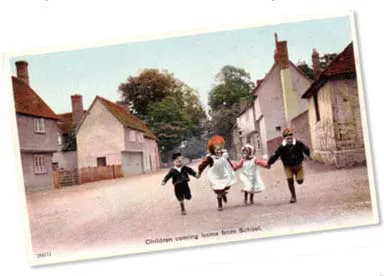
FREEDOM! Late Nineteenth Century school children.
Milk time
When I was at school, milk time was a highlight, because it was the prelude to playtime. The quicker we drank our milk, the quicker we could go out to play. We were all given a piece of cardboard with lines of wool attached, and shown how to weave. This was important, because we were making a milk mat, so that we didn’t put wet milk bottles on our desks. Of course, we all pulled the wool too tight so our mats had waists, but they were brightly coloured and made our desks look jolly. The milk came in small glass bottles and the caretaker had made a hole in each foil lid to push the paper straw through.
Remember those little glass bottles? They held a third of a pint (200ml) of creamy milk and, for many children, it was the only milk they would get to drink. It was invaluable for their health. At first, the tops were made from cardboard, but later were replaced by foil. Sometimes in summer, the milk was left standing in the sun and became warm and curdled, but we still drank it. In the winter, the caretaker would put the crate by the radiator to warm it up a bit – it never went properly warm, just a bit tepid and tasted horrible. In 1971, a certain Education Secretary decided free milk in all schools was no longer a priority, especially for older children, and so she became known as ‘Mrs Thatcher, Milk Snatcher’. Nowadays, less than twenty-five per cent of school children have milk at school.
Playtime
After milk time came playtime. Playtime in the 1950s was quite gentle; sometimes girls would bring in their dolls’ prams and push them sedately around the playground. A small group of us were fascinated by a wall in the playground made from soft yellow brick, and were convinced fairies lived in the little holes in the bricks. Bizarrely, we would solemnly scrape up the lumps of chewing gum which dotted the playground and push it into the holes for the fairies. Whether we were feeding them or blocking their escape route, I can’t remember!
CARING FOR BABY – Girls with dolls.
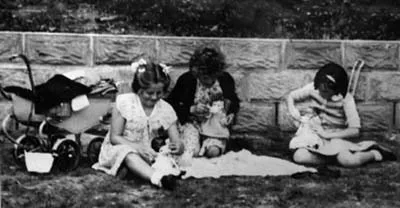
The reason there was so much chewing gum around was probably because many shops had a chewing gum machine outside. You put in a penny and turned a knob, and a piece of gum came out. However, every fourth turn produced two pieces of gum – presumably as a way of enticing people to buy more than one piece – and an arrow was helpfully marked on the knob. When the arrow was in a certain place you knew you would get two pieces, a bargain. Many children would chew gum, then spit it out. My friends and I thought that was not only ‘rude’, it was wasteful, so we swallowed it. So far, I am pleased to report, I have experienced no harmful effects!
Many of us liked to spend time holding onto the ‘playground lady’ (the lady who kept an eye on the playing children). Sometimes, she might have a dozen little girls attached to her hand, arm or coat. Every so often, we would all halt as a desperate child ran up to plead for a sheet of toilet paper. The toilets were in the playground, and the dinner lady carried a pack of paper around with her. She would carefully peel off a sheet for the needy child–sometimes two, if she felt generous–and then we would proceed with our circuit of the playground. The playground lady was the recipient of all our secrets, and must have had a wonderful time regaling her colleagues later.
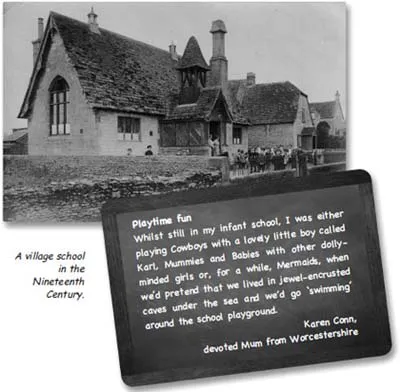
Playground games
Hopscotch, skipping, marbles, five-stones and He (or tag) were the popular 1950s playground games, as well as chanting games such as Oranges and Lemons or Farmer’s in the Dell (see p22). These games would have been known to our parents, grandparents and great-grandparents, who played similar games when they were at school. Some of their pastimes, though, would have been unfamiliar to us. We probably wouldn’t have chased after a metal hoop, coaxing it along with a stick. Most of us didn’t play with wooden spinning tops which hummed when you whipped them with string tied to a stick, and we didn’t all play Squeak Piggy Squeak or act out charades.
TAKING AIM – Marbles.
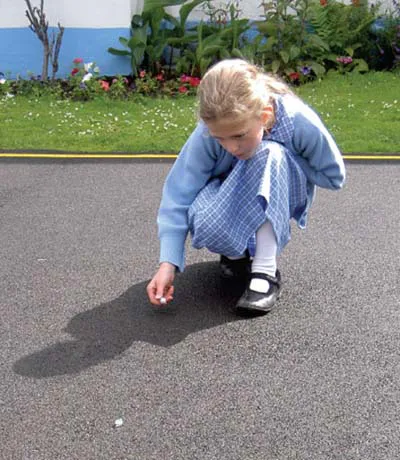
Imagination was the vital ingredient – we would act out situations. A particular favourite was Mothers and Fathers, which could be played by quite a large group who would take the parts of different adults, children, pets and neighbours. We had a school field at our primary school in Welwyn Garden City, Hertfordshire, and the hedges and low-growing hawthorn trees formed excellent ‘houses’. Various chasing games were also played and, if we were really lucky, two of the boys would pick a fight and a glorious scramble would break out as more and more boys joined in, the girls cheering them on. Eventually, of course, a harassed teacher would break up the fight; these fights were never vicious, just outbreaks of high spirits.
Nonsense songs and rhymes were definitely ‘in’ when we were young; parodies of popular songs, made-up limericks, doggerel verse – they all echoed around the playground, recounted, polished and refined as they were passed from child to child. Unlike today’s school playground rhymes, the ones we learnt weren’t really rude – also, unlike today, they didn’t contain swear words, and certainly four-letter words never cropped up. I can remember a child using the word ‘bum’ in class and shocking everyone!
Where has childhood gone?
Over the last few years, there have been various surveys and reports regarding the decrease in children’s outdoor play. In this modern world of computers, hand-held game consoles, i-pods, DVD players and easily affordable television sets, children often prefer to spend their leisure time watching or playing with an electronic device, rather than following traditional or outdoor pursuits. Games which have been handed down from generation to generation and rhymes which have passed from child to child, are in danger of being lost and forgotten. Whereas a child of a previous generation would enjoy tree climbing, making a camp, digging in a sandpit or sailing a boat on a pond, to the modern child, these attractions are often unknown or impractical. We are all aware of the loss of freedom to today’s children when compared to our own childhood. Years ago, children were free to wander, even in fields and woods, on their own or in groups, or could play in the streets in safety. Nowadays, worried parents keep a much tighter rein over their children’s activities, but, as consolation, shower them with electrical goods and expensive toys to entertain them and, in some cases, to ease the busy parents’ conscience.
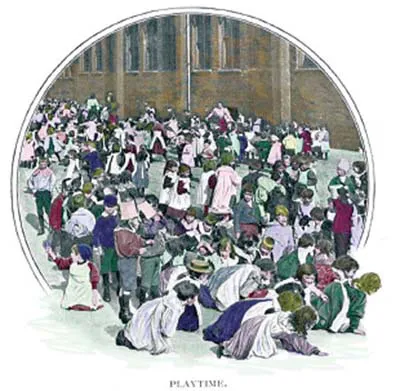
VICTORIAN PLAYTIME.
Forgetting past pleasures
A primary school head in North Wales said that it was necessary to teach some of her new pupils to walk on bumpy grass, as they had never done such a thing before. Their parents had exercised strict control by making them keep to the pavements – imagine children who have never known the sheer joy of running barefoot through dewy grass, or have never strode through a grassy meadow, feeling the tractor ruts, rabbit runs and tangled sedges beneath their feet, or the long feathery grasses tickling their knees as they race through it.
Problems of a different kind are also encountered in the school playground – pupils bring electronic hand-held games to school, or they listen to their i-pods, scorning skipping, chasing and other traditional games. Apart from football, which is still very popular, ball games are less often played, while games involving singing or chanting in a circle are rare, because, as one youngster said, “The big children make fun if we sing those kinds of things”. Schools themselves must take some responsibility as many have placed bans on playground games, fearing they might be sued if a child is injured.
Consequently, a recent survey found that traditional school playtime games, such as skipping, conkers, hopscotch, marbles and He are fast disappearing. Instead, children prefer to spend their break times playing with electronic games, chatting or acting out scenes from cartoons and, worryingly, soap operas. It’s cool just to hang out and discuss the new fashions, pop groups, TV shows, ‘celebs’ and the latest trends. Children are no longer working off surplus energy and getting a beneficial amount of exercise; now, they are much more sedentary which, in turn, is leading to problems with obesity.
Less active
Activities which parents remember from their own childhood, such as seaside day trips, harvest festivals, nativity plays, museum visits, school milk breaks, school fêtes – and, of course, traditional playground games – are rapidly becoming a thing of the past. Out of school activities too, such as tree-climbing, building dens, going for walks, cycling and street games, are often not possible for today’s children. Most parents won’t let their youngsters out of their sight, apart from when they are safe in school; the freedom which previous generations took for granted is, sadly, no longer possible. Society has changed; today’s children no longer trust a friendly stranger – not even the local policeman. Adventures undertaken by children such as ...
Table of contents
- Cover
- Title Page
- Copyright
- Contents
- Introduction
- 1 School Days - Playtime Pleasures and Lost Games
- 2 Favourite Playground Songs - Oranges and Lemons
- 3 Sing Song Chants - With a Knick-Knack Paddywhack
- 4 Rhymes and Puns - One Potato, Two Potato
- 5 Games without Props - Simon Says, “Who Needs a Playstation?”
- 6 It or He - You Can’t Catch Me!
- 7 Childhood Nonsense - I Beg Your Pardon
- 8 Ball Games - It’s My Ball and I’m Going Home
- 9 Clapping Games - Pat-a-Cake
- 10 Skipping and Chants - Bumps and Grinds
- 11 Flower Games - Daisy Chains
- 12 Playing with Things - Don’t Lose Your Marbles
- 13 Indoor play - The Sun Has Got His Mac on
- Acknowledgments
- Photo Credits and Further Reading